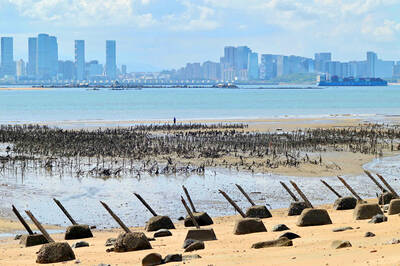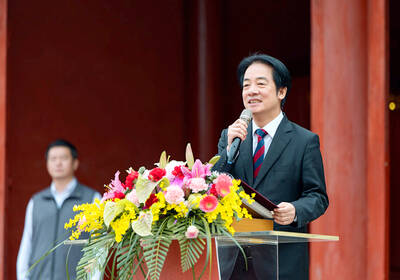President Chen Shui-bian (陳水扁) yesterday said he welcomed the opinions of a group pan-green academics who have asked him to step down voluntarily amid the recent spate of corruption allegations involving his in-laws.
"The president always takes different opinions seriously and appreciates the advice of the academics," said Presidential Office Spokesman David Lee (李南陽). "I'd like to point out that the president emphasized his administration's core values in his latest weekly e-newsletter and the values correspond to those advocated by the academics."
Lee made the remarks in response to articles published in yesterday's Chinese-language United Daily News and China Times.
According to the reports, the academics will release a statement entitled "Democracy and the Moral Crisis of Taiwanese Identity -- Our Appeal to the President, the Ruling Party and Taiwanese Citizens."
The papers reported that a group of pan-green academics was planning to ask Chen to seriously considering stepping down because he has lost credibility and the trust of the people.
Wu Nai-teh (吳乃德), one of the academics, confirmed yesterday that the group has launched a signature drive to pressure Chen into resigning and is planning to hold a press conference at 3pm tomorrow to make public a joint statement.
"As the legislature failed in its recall attempt, we would like to have seen President Chen take the initiative and resign so he can set a good example for Taiwan's democratic politics," he said.
Wu, the younger brother of former Taiwan Stock Exchange chairman Wu Nai-jen (吳乃仁), co-founded the pro-democracy magazine New Tide along with National Security Council Secretary-General Chiou I-jen (邱義仁) in June 1984. The name of the magazine later became that of the Democratic Progressive Party's (DPP) biggest and most organized faction. The faction has been at odds with Chen over cross-strait economic policy.
When asked if their proposal would irk pan-green supporters, Wu Nai-teh said they would "humbly accept" the consequences.
"We are just a small bunch of academics making a proposal, hoping to see the public engage in a debate on the issue," he said.
DPP spokesman Tsai Huang-liang (蔡煌瑯) yesterday said the party was surprised by the statement drafted by "these old friends" but the DPP was willing to listen to their opinions and would speed up the implementation of reforms in reaction to their expectations of the DPP.
DPP Legislator William Lai (賴清德), who is also the leader of the DPP's New Tide faction, said the party had always valued the opinions of scholars and added that this was a spontaneous action launched by the academics.
Lai said that the DPP's New Tide faction had no prior notice about the statement.
DPP Legislator Lee Wen-chung (李文忠) said he admired the courage of the intellectuals but the DPP had resolved that it did not support Chen stepping down.
While DPP Legislator Gao Jyh-peng (高志鵬) said he respected their advice, DPP Legislator Lee Chun-yee (李俊毅) said he did not agree with the academics.
"People should respect judicial procedures and I don't think the president's resignation would solve any problems." Lee said. "It would only trigger a political crisis and I don't think those scholars, living in their ivory towers, could imagine the aftermath."
"It is the president's responsibility to stay in his position, I don't think the president needs to respond to their request," Lee said.
As for Chen's e-newsletter, in his latest weekly online newsletter to be published today, Chen said his administration has been striving to bolster core values as a Taiwanese identity and realize social justice and fairness.
Under such values, Chen said that his administration's ultimate goal was to increase investment in Taiwan, create job opportunities, shorten the distance between cities and counties, and narrow the gap between the rich and poor.
Chen added that the direction of cross-strait economic policy had not changed since his New Year announcement that cross-strait economic policy would change from "active opening, effective management" to "active management, effective opening."
"The cross-strait economic relationship should not be simplified to merely tightening or relaxation," he said.
"The problem lies in the lack of active and effective management of China-bound investment," he said.

THREATS: Naval facilities have been built in Shanghai and Zhejiang, while airbases have been expanded in Xiamen, Fuzhou and Zhangpu, across the Strait from Taiwan The Chinese Communist Party (CCP) is building large-scale military infrastructure at five sites along the eastern coast of China, the Mainland Affairs Council (MAC) said in a recent report. The latest issue of the council’s Mainland China Situation Quarterly said satellite photos showed military infrastructure such as air force and naval bases being constructed along the eastern coast of China. That means the CCP might be preparing for potential conflict in Taiwan, it said, adding that there are five such construction sites from north to south. A naval base has been built in Shanghai’s Pudong New Area, with underground oil storage tanks, railway

GIVE BACK: The president thanked immigrants, recounting heartwarming stories, from a gymnast helping athletes shine internationally to a spouse helping the disadvantaged There is no need to amend the law to exempt Chinese spouses from single allegiance to the Republic of China (ROC), President William Lai (賴清德) said yesterday, adding that such changes would only increase the public’s doubts toward new residents from China and would not improve social harmony. Taiwan is a democratic, diverse and free country, he said. “No matter which ethnic group you belong to, where you come from or when you arrive, as long as you identify with Taiwan, you are masters of this country,” he said. Taiwan is a democratic nation that follows the rule of law, where immigrants are

A trial run of the north concourse of Taiwan Taoyuan International Airport’s new Terminal 3 is to commence today, the Ministry of Transportation and Communications said yesterday. The eight additional boarding gates would allow for more aircraft parking spaces that are expected to boost the airport’s capacity by 5.8 million passengers annually, Deputy Minister of Transportation and Communications Lin Kuo-shian (林國顯) said. The concourse, designed by a team led by British architect Richard Rogers, provides a refreshing space, Lin said, adding that travelers would enjoy the tall and transparent design that allows sunshine to stream into the concourse through glass curtain walls. The

LOOPHOLES: The defense ministry’s proposed amendments to the military criminal code harm security interests and set the evidentiary threshold too high, an expert said Democratic Progressive Party (DPP) lawmakers have proposed revising military laws to stipulate that any active-duty military personnel who express allegiance to the enemy could face two to seven years in prison, adding that soldiers’ loyalty to the nation means “no freedom of expression.” In the past few years some military personnel have pledged allegiance to China through videos and documents, but it is not punishable under the law. In its draft amendment to Article 24 of the Criminal Code of the Armed Forces (陸海空軍刑法), the Ministry of National Defense proposed only making actions that “harm the military’s interests” punishable, citing freedom of